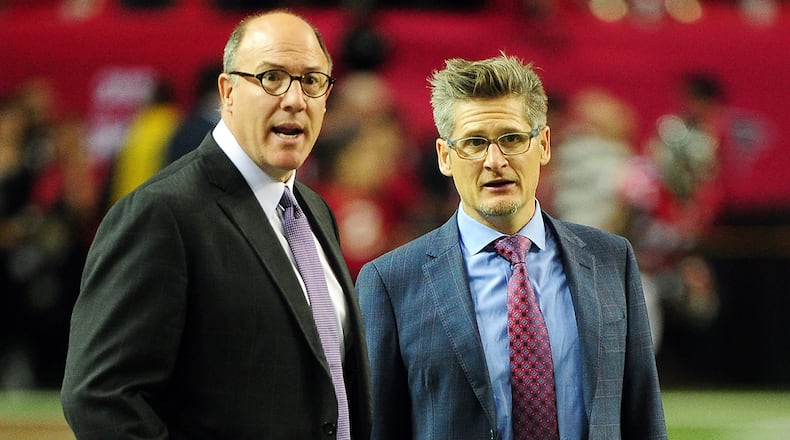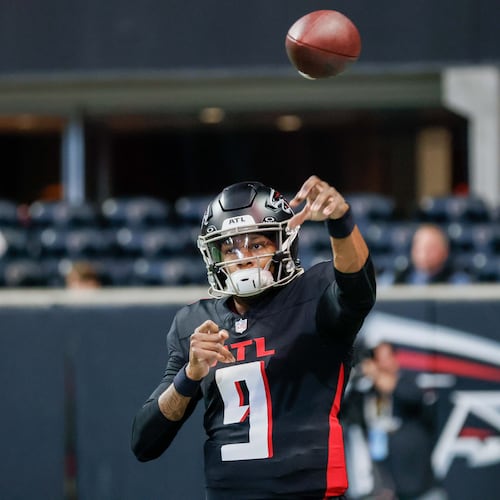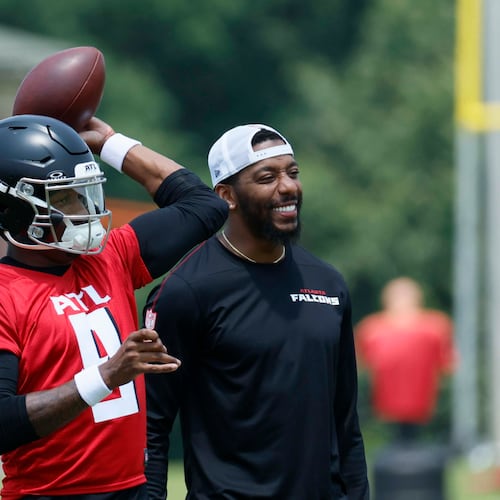The comparisons to Seattle are inevitable.
The Seahawks, with a young defense in 2012, battled the Falcons before succumbing 30-28 in the divisional round of the NFC playoffs at the Georgia Dome.
The Seahawks were loaded with young talent and you knew they’d be tough to deal with in the future.
After the loss to the Falcons, they went 13-3 and won the Super Bowl after the 2013 with Dan Quinn as their defensive coordinator.
After going 12-4 in 2014, the Seahawks went back to the Super Bowl and nearly won against the Patriots. After that game, Quinn was named the new Falcons head coach.
The Seahawks went to the playoffs five years in a row before going 9-7 last season and now are in rebuilding mode. Some of their defensive stars got older and other’s they couldn’t afford to retain in the salary cap era. All pitfalls the Falcons will try to avoid.
The Falcons’ championship window opened when they reach the Super Bowl after the 2016 season with the 27th ranked defense in points allowed. After climbing back to the playoffs last season, the Falcons are hoping for an elusive Super Bowl victory.
“With all due respect to Seattle, I think Seattle has done some fine things over the years with John Schneider and Pete Carroll together,” Falcons general manager Thomas Dimitroff told The Atlanta Journal-Constitution. “There are elements that we bring from Seattle as there are elements that we brought from New England. We completely don’t see ourselves as any other team in the NFL. We all bring principles and approaches from teams that we’ve been with, I don’t care where we have been.”
Now, Seattle is looking for the next Richard Sherman, Kam Chancellor and Marshawn Lynch.
“We have focused on being the Atlanta Falcons,” Dimitroff said. “We are focused on being a tough, aggressive, passionate and fiery football team. Dan Quinn does an excellent job. He and his staff have a really sound understanding on how to put together defenses. We have a very creative offense that we want to continue to build with that is fast, explosive and athletic like our defense is.”
Even with All-Pro wide Julio Jones skipping the offseason workouts, the Falcons were able to keep their key players in place. For now.
They signed quarterback Matt Ryan to a six-year, $150 million extension. Left tackle Jake Matthews (five years , $75 million) and free safety Ricardo Allen (three years, $19.5 million) were also signed to extensions.
Building a Super Bowl caliber team is possible. Keeping it together is no longer an option in the salary cap era. If Seattle is the case study, the window is five years.
“Obviously, one of the major challenges is to make sure that you can be creative from a finance standpoint and make sure that you can fit all of your pillar players into a really good plan that you can continue on for years and years to come,” Dimitroff said. “That is a massive challenge for general managers and organizations.”
The Falcons have stock-piled talent through good drafting.
“We feel like we have a very firm grasp of it,” Dimitroff said. “With that said, there are always going to be difficult decisions to be made, unfortunately, that’s just the way it is without an unlimited cap. We will be faced with a lot of tough decisions in the next two or three years for sure.”
The Falcons are currently overloaded at running back and in the secondary. Running back Tevin Coleman will be able to name his price on the open free agency market if he turns in another strong season.
The Falcons have starting cornerbacks Robert Alford and Desmond Truant along with nickel back Brian Poole. They drafted Isaiah Oliver in the second round and Damontae Kazee is an emerging safety in the crowded secondary with Allen and former first-round pick Keanu Neal, who went to the Pro Bowl last season.
“It is a great problem to have,” Falcons defensive coordinator Marquand Manuel said. “I think it creates competition within itself.”
Manuel was an assistant coach with Seattle from 2012-014.
“One thing that I had in Seattle was that was great for me was Brandon Browner pushed Byron Maxwell which got both of those guys paid,” Manuel said. “Then Jeremy Lane came in right behind that. Then you talk about (Richard Sherman), right behind Sherm it was Kam, it was Earl (Thomas) and we continued that. “Then Bobby (Wagner) came in. It’s that continued cycle where you add on. ... We might not all be here forever, but the next guy is pushing the next guy and that creates greatness on the defense.”
New England, Pittsburgh and Green Bay are teams that have sustained winning over a long period of time. Although, Green Bay made a major change in replacing Ted Thompson as general manager this offseason.
The Falcons are hoping to keep their window open longer than Seattle’s five-year period. A big part of the plan has been to lean on senior talent evaluators in former general managers Scott Pioli (Kansas City, 2009-12), Phil Emery (Chicago, 2012-14) and Ruston Webster (Seattle, interim general manager 2009 and Tennessee, 2012-016).
“There is no question having that veteran talent evaluator within the organization is great,” Dimitroff said. “It’s really important to have. I think you’ll see many, many more organizations making sure they have veteran talent evaluators.”
The Falcons have useful and meaningful discussions over players they hit or missed on over the years.
“Scott Pioli, Ruston Webster and Phil Emery, all of those guys continue to aid, not only to me quite honestly, but we have great conversations that they are able to aid our scouting staff in our scouting meetings,” Dimitroff said. “We have great round table discussions.
“What I really value from the three guys I mentioned is they are so open to talk about the misses and not just laud themselves on their hits. We spend a lot more time talking about misses and how we can correct them than we do hanging out (and discussing) the things that have gone well for this organization.”
About the Author
Keep Reading
The Latest
Featured




